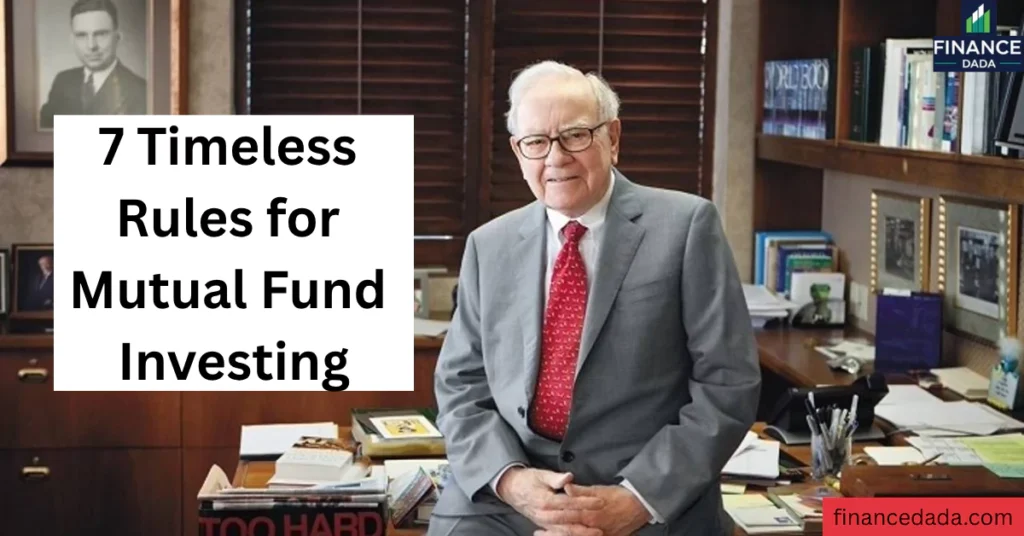Warren Buffett’s 7 Timeless Rules for Mutual Fund Investing
Warren Buffett’s 7 Timeless Rules for Mutual Fund Investing: Warren Buffett, the legendary investor and CEO of Berkshire Hathaway, is renowned for his straightforward yet powerful approach to wealth creation. His investment philosophy, rooted in discipline and long-term thinking, offers valuable lessons for mutual fund investors. Drawing from his decades of success, here are seven golden rules inspired by Buffett’s wisdom, reimagined in a fresh, human-written tone to guide you toward smarter mutual fund investments.

Warren Buffett’s 7 Timeless Rules for Mutual Fund Investing
1. Invest in What You Understand
Buffett famously advises, “Never invest in a business you cannot understand.” For mutual fund investors, this means choosing funds with clear strategies and sectors you’re familiar with. Whether it’s equity funds focused on large-cap stocks or bond funds for fixed income, research the fund’s holdings, objectives, and management style. For example, if you’re comfortable with technology or consumer goods, opt for sectoral funds in those areas rather than complex derivatives or niche markets you don’t grasp.
Actionable Tip: Review the fund’s fact sheet and portfolio holdings on platforms like Morningstar or the fund house’s website. Stick to funds with transparent strategies aligned with your knowledge base.
2. Focus on Long-Term Growth
Buffett’s mantra is to buy and hold for the long haul, famously stating he’d rather own a great company for decades than chase short-term gains. In mutual funds, this translates to prioritizing funds with consistent performance over 5–10 years rather than chasing recent high-flyers. Equity mutual funds, especially large-cap or diversified funds, are ideal for long-term wealth creation, as they benefit from compounding over time.
Actionable Tip: Look for funds with a strong track record (e.g., 10%+ annualized returns over a decade) and low portfolio turnover, indicating a focus on long-term holdings. Use SIPs (Systematic Investment Plans) to stay disciplined.
3. Keep Costs Low
Buffett is a vocal advocate for minimizing investment costs, as high fees erode returns over time. He once bet that a low-cost S&P 500 index fund would outperform actively managed funds over a decade—and he won. For mutual fund investors, this means prioritizing funds with low expense ratios, ideally below 1% for active funds and even lower for index funds or ETFs.
Actionable Tip: Compare expense ratios across similar funds using tools like Moneycontrol or Value Research. Opt for direct plans over regular ones to save on distributor commissions, which can add up significantly over time.
4. Diversify, but Don’t Overdo It
While Buffett prefers concentrated investments in businesses he trusts, he acknowledges the value of diversification for most investors. Mutual funds inherently offer diversification, but holding too many funds can dilute returns and complicate portfolio management. A balanced portfolio of 4–6 funds across large-cap, mid-cap, and debt categories often suffices for retail investors.
Actionable Tip: Allocate your portfolio based on your risk tolerance—e.g., 60% large-cap funds, 20% mid-cap funds, and 20% debt funds for a moderate-risk investor. Avoid overlapping funds with similar holdings to maintain true diversification.
5. Ignore Market Noise
Buffett advises investors to tune out short-term market fluctuations and focus on fundamentals. Market volatility, driven by news or economic events, can tempt you to time your mutual fund investments. Instead, stay committed to your investment plan, as timing the market consistently is nearly impossible. Regular investments through SIPs help you average out costs and reduce the impact of market swings.
Actionable Tip: Set up an SIP and automate your investments to avoid emotional decisions during market dips or rallies. Review your portfolio annually, not daily, to stay aligned with your goals.
6. Trust Quality Fund Managers
Buffett emphasizes investing in businesses run by competent, trustworthy leaders. For mutual funds, this means selecting funds managed by experienced fund houses with a proven track record. Look for managers with a consistent investment philosophy, low turnover in their team, and a history of navigating market cycles effectively.
Actionable Tip: Research the fund manager’s tenure and performance across market conditions. Funds from established houses like HDFC Mutual Fund, SBI Mutual Fund, or ICICI Prudential often have seasoned teams and robust processes.
7. Be Patient and Disciplined
Buffett’s wealth is a testament to the power of patience, with his favorite holding period being “forever.” Mutual fund investors should adopt a similar mindset, staying invested through market ups and downs to reap the benefits of compounding. Patience, coupled with disciplined investing, ensures you don’t panic-sell during corrections or chase trends during bull runs.
Actionable Tip: Set clear financial goals (e.g., retirement, child’s education) and align your mutual fund investments with a 5–10-year horizon. Use tools like goal-based calculators to track progress and stay committed.
Why Buffett’s Rules Matter in 2025
As of July 2, 2025, India’s mutual fund industry is booming, with assets under management (AUM) surpassing ₹60 lakh crore, driven by rising investor confidence and financial literacy. However, volatility from global economic shifts, such as US Fed rate decisions or geopolitical tensions, underscores the need for Buffett’s timeless principles. His focus on simplicity, low costs, and long-term discipline aligns perfectly with mutual fund investing, where steady contributions via SIPs and quality fund selection can yield significant returns.
For example, data from AMFI shows that equity mutual funds delivered average returns of 12–15% annually over the past decade, outpacing inflation and fixed deposits. By following Buffett’s rules—choosing low-cost, diversified funds and staying patient—investors can harness this growth potential while managing risks.
Final Thoughts
Warren Buffett’s seven golden rules offer a roadmap for mutual fund investors seeking sustainable wealth creation. By investing in understandable funds, keeping costs low, diversifying wisely, ignoring market noise, trusting skilled managers, and staying patient, you can build a robust portfolio aligned with your financial goals. In today’s dynamic market, these principles are more relevant than ever, helping you navigate volatility and capitalize on India’s growth story.
Also Read: Bajaj Finserv Aims for 250 Million Customers by 2029: A Bold Bet on India’s Growth
Disclaimer: Investing in mutual funds involves market risks. Past performance is not indicative of future results. Consult a financial advisor and review fund documents before investing.









